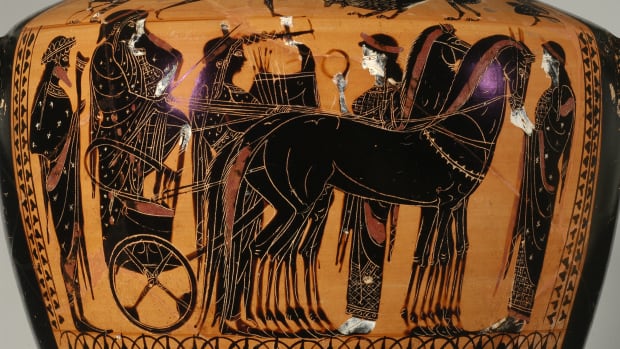
Willemijn van Dolen | How the ancient Greeks were already doing marketing
Influencers and audience analysis: even the ancient Greeks were already doing marketing, writes Willemijn van Dolen. “Marketing was so important that there was a separate goddess of sales talk: Peitho, described by the poet Herodas in his story about the sales tactics of shoemakers.”
December is a month of retrospection. You trip over the annual reviews, reflections, year-end reflections - contemplations on the old, on the way to the new.
I thought it would be fun to look back at my field of marketing in this spot, too. But in an earnest way: we are going back in time not one year, but a few thousand years, back to ancient times. Marketing literally means: to bring to market. And the market is also where the ancient Greeks traded. On the agora they sold foodstuffs and utensils, as well as luxury goods such as spices, cinnamon, gum and incense from distant lands.
The Greeks marketed these goods enthusiastically, using marketing techniques that will be familiar to you; to arouse customers’ curiosity, luxury products were advertised as “exotic”. Potential customers were allowed to taste, smell and feel. And even in ancient times, people thought: what is expensive must be good.
But marketing in ancient times was not all about the market alone. Young people were a target group to be taken into account with even then; they had their own jargon, their own style and their own hangouts near the perfume stalls at the market. Wealthy young people distinguished themselves by owning horses. Equestrianism was elite and popular during the Olympics, and young people used horses to show off. The Greek word for horse, hippos, was often an honorable part of their family name, think Filippos, Hippokrates and Xanthippe. Horses were the sneakers, telephones and fatbikes of today.
Also, the ancient Greeks already had influencers: Alkibiades was the most beautiful boy in Athens and influenced the consumer behavior of his 40,000 fellow townspeople like a true opinion-leader. Fun example: in those days, almost every family had an aulos in their home - an oboe-like wind instrument. But Alkibiades thought it gave you bulging cheeks and disfigured your face. He threw away the instrument and loudly proclaimed his dislike. His followers followed his example and soon everyone abandoned the horn.
Another fine example of ancient Greek marketing can be seen in images on classical vases. The finest ceramics came from Athens and had beautiful red and black colors. The vases first depicted mythological gods and heroes, and their own alphabet. Especially men bought these vases. But the constant wars changed the target group. There came a shortage of men. Now it was mostly women who bought vases. And they had a different taste - so vases came with home, garden and kitchen scenes, pictures of the love god Eros, and marital scenes.
And so we could go on and on. Marketing was so important in ancient times that there was a separate goddess of sales talk: Peitho, described by the poet Herodas in his account of the sales tactics of shoemakers. But there are also differences. In ancient times, almost exclusively men did the shopping. And there was no fashion: everyone wore the same thing for centuries.
Marketing is of all times, but never the same. How will marketing historians in a few thousand years look at marketing today? Presumably they’ll say to each other, perhaps in a language that doesn’t exist today: marketing, that’s nothing new under the sun, those ancient twenty-first-century people had it too.
PS: My source of knowledge about antiquity is Hein van Dolen.

